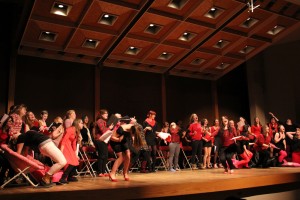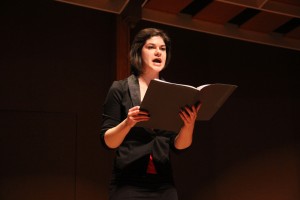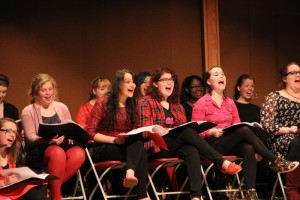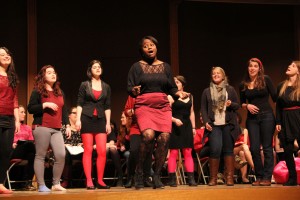
By Sara Jane Sheehan, Cecilia Smith and Morgan Christie
Transcript Correspondents
Women dressed in pink, red and black lined the Jemison Auditorium in Sanborn on Friday and Saturday night for performances of “The Vagina Monologues.”
The production ushered in Women’s Week and commemorated the 15th anniversary of the international V-Day movement to stop violence against women and girls.
“The Vagina Monologues” by Eve Ensler is a narrative based on women’s experiences about their bodies and sexualities.
According to Ensler, “The Vagina Monologues” has been performed in hundreds of countries to help to end violence against women.
“‘The Vagina Monologues’ is a beautiful piece of feminist activist theatre that brings together a diverse group of women to present various facets of the global female experience,” said senior Leah Shaeffer, co-director and producer.
“Our cast and supporters formed an amazing community this year, strengthening friendships and promoting equality and empowerment for all.”
This was the second consecutive time “The Vagina Monologues” was performed at Ohio Wesleyan.
According to Shaeffer and co-director and producer Andrea Kraus, also a senior, this year’s performance was bigger and better.
Shaeffer said last year, “The Vagina Monologues” started as a house project for the Women’s House (WoHo) and the House of Peace and Justice (P&J). She said there were over 50 women involved with the show this year.
The 50 students read monologues on topics ranging from pubic hair, body image, reclaiming gender-based slurs, rape culture, beatings of transgender-identifying youths and sexual violence.

It ended with a dance to the song “Break the Chain,” the official song of the V-Day movement.
The performance was free for students, but donations went to benefit Delaware County HelpLine’s Sexual Assault Response Network.
“‘The Vagina Monologues’ and the V-Day movement have really opened my eyes to what I can personally do to be a part of the global fight to end violence against women and girls,” Shaeffer said. “By raising awareness and supporting local organizations like HelpLine’s Sexual Assault Reponse Network, we are doing what we can to stop the violence.”
At the end of the show Shaeffer and the seniors in the monologues performed a monologue about ending rape culture. Kraus then led the whole ensemble into a monologue about One Billion Rising. Each performer stood up and stated why they were rising to end violence against women.
Kraus said she thought ‘The Vagina Monologues’ was particularly relevant to OWU this year because of recent incidents on campus, and she wants the show to encourage people to talk.
“My goals going into this show were to educate and cause the audience to experience an emotion of some sort,” she said. “I think it’s important for the audience to think about the women in their lives and how this relates to them and hopefully be able to take action. I just want people to feel open and free and empowered.”
Sophomore Jordane Faith said she participated in the production because it “reminds (her) we aren’t done fighting.” Faith read the monologue “I Was 12, My Mother Slapped Me.”
“Injustice and violence against women hasn’t ended and won’t anytime soon unless women and men alike stand up and stop supporting rape culture,” she said.
Kraus said the show still moves her even though she’s seen it several times.
“I still have different reactions every time I hear those monologues,” she said. “Hearing some of those stories brings to life the idea that this is still an issue, there is still work to be done, but that we can make a difference.”
To freshman Reilly Reynolds, “The Vagina Monologues” means feeling strong and good about being a woman, and using this view to create a positive self-image.
Reynolds,said there are “so many women” who do not have a positive self-image about themselves as women, something she hopes to change through her involvement in “The Vagina Monologues” and V-Day.
Sophomore Felicia Rose, who performed in the monologue “My Angry Vagina,” said she is taking part in this year’s production after seeing the play performed last year and being “thrown around emotionally.”
“I wanted to be a part of something that could have a strong presence in the life of someone else here at OWU,” she said. “I am a politics and government major interested in social issues. I think that the theater is a place where social commentary on social issues can have a big impact.”
Freshman Hannah Simpson, another performer, is a theater major who believes in the influence theater can have on social issues.
Simpson said she got involved in the play not only to take advantage of the performing opportunity, but also because she believes activist projects like “The Vagina Monologues” can help her grow as someone who fights for women’s rights.
Freshman Casey Skrove, who performed in “Six Year Old Girl,” said she and the rest of the all-female cast need to do their part in educating others about violence against women and rising up against such violence. She said she hopes the audience walks away with a “new outlook and motivation to stop the violence.”
Reynolds said the heavy content of the show is meant to evoke emotions that make viewers want to “jump out of their seats and do something about it.”
“We’re looking to spread knowledge, and to make people want to never take a backseat again when it comes to the safety and rights of women,” she said.
Rose said she is interested in informing the student population about the issues concerning women and wants the play to provide students with an opportunity to express their thoughts on the subject.
“I hope students that walk away from this play will have the ability to openly talk about the issues concerning them,” she said. “I hope they understand that there is a powerful supportive presence on this campus waiting with open arms to support them in any facet.”
Simpson said she hopes students who see the play will walk away with a better understanding of how much of a problem rape culture is and that ending it begins with the individual.

Rose says the play means she is not alone and she has great power to influence those around her.
Skrove said the play means being able to do her part in educating others and rising up against the violence.
Simpson said she feels the play represents how she has grown as an activist.
“Before I came to college, I had never let anyone tell me I couldn’t do something because I was a girl, and I had zero tolerance for sexism,” she said. “After being involved with (‘The Vagina Monologues’), I feel like I have more ownership of my feminism.”
Reynolds said she hopes the messages presented by the cast in “The Vagina Monologues” will be present in students’ minds year-round.
“We’re striving to make a difference here in our small town, and we believe that difference is going to spread world-wide,” she said.